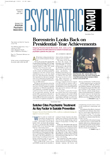Parity for mental illness in Medicare is gaining momentum on Capitol Hill. A new bill introduced in the Senate last month would reduce the Medicare copayment for mental illnesses from 50 percent to 20 percent, which is the level for other types of illnesses.
The bill addresses only parity in copayments in contrast to comprehensive Medicare reform bills introduced in April by Sen. Paul Wellstone (D-Minn.) and Rep. Pete Stark (D-Calif.) in the Senate and House, respectively (Psychiatric News, May 4). Those bills (HR 1522, S 690) call for parity in copayments, elimination of the 190-day lifetime limit on inpatient stays in a freestanding psychiatric facility, and expanded coverage for certain “community-based outpatient and intensive residential services.” APA supports many of the bill’s features.
The new bill, known as the Medicare Mental Illness Nondiscrimination Act of 2001 (S 841), was introduced by Senators Olympia Snowe (R-Maine) and John Kerry (D-Mass.). The bill is a companion to HR 599, which was introduced by Rep. Marge Roukema (R-N.J.) in February. It had 43 cosponsors at press time.
APA Immediate Past President Daniel Borenstein, M.D., commented in a press release, “The current Medicare system imposes a policy of discrimination by diagnosis that inflicts a heavy toll on Medicare patients who, by no fault of their own, happen to suffer from mental illness.”
That older Americans need access to mental health care has been documented in many reports. For example, according to a recent report on suicide by U.S. Surgeon General David Satcher, M.D., up to 20 percent of older adults in the United States in general and nearly 40 percent of older adults treated in primary care settings experience symptoms of depression.
In addition, suicide disproportionately affects the elderly. In 1998 this group represented 13 percent of the population, but accounted for 19 percent of all suicide deaths, according to the report.
The risk factors for suicide among older persons differ from those among the young. In addition to having a higher prevalence of depression, older persons are more socially isolated and use highly lethal methods more frequently than young people, noted the report. They also make fewer attempts per completed suicide, have a higher male-to-female ratio than other groups, have often visited a health care provider before their suicide, and have more physical illnesses, according to the report.
People of any age with severe mental illnesses who are Medicare beneficiaries would also benefit from parity in copayments. The National Alliance for the Mentally Ill estimates that about 400,000 individuals fall into this category, according to the press release.
“Medicare’s intrinsic discrimination adversely affects the elderly and disabled by increasing their cost of care and creating major financial disincentives for them to seek care when needed,” said Borenstein. “All we are asking is that Medicare treat patients with mental illness just like any other patients.”
Borenstein commended Snowe and Kerry for “their tireless dedication to ending discrimination against persons struggling with mental illness. We pledge to work with them to see that this landmark bill becomes our national law.” ▪
